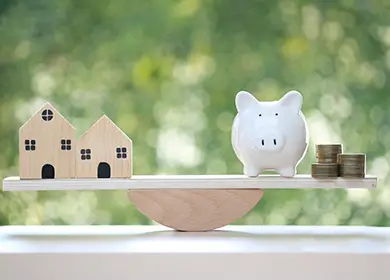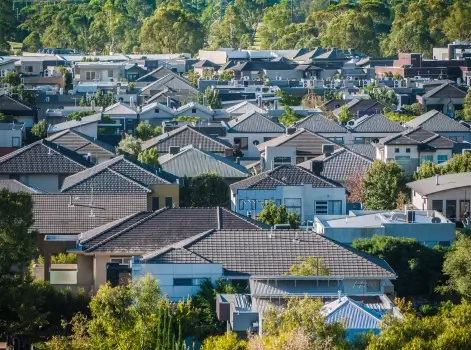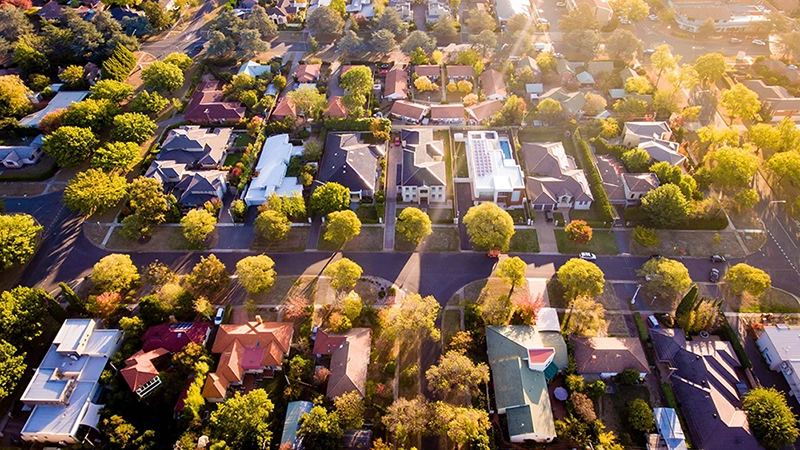Updated: 29 May, 2025
CoreLogic’s Home Value Index for May 2022 recorded its first national monthly decline since September 2020. National home values fell 0.1%.
Sydney and Melbourne recorded falls of 1% and 0.7%, respectively. Canberra experienced its first monthly decline (-0.1%) since July 2019.
Even though housing values rose in the remaining capitals, it was not enough to offset the decline experienced in those three cities. The combined capitals experienced a 0.3% fall.
- Sydney’s housing values are down 1.5% since peaking in January, but still 22.7% above pre-pandemic levels.
- Melbourne’s growth phase was softer than Sydney’s. It has now recorded a smaller peak-to-date decline (-0.8%); its housing values are 9.8% higher, compared with pre-pandemic levels.
- Canberra had experienced three years of consistent positive growth. Its dwelling values increased 2.2% in the three months to May. Its housing values are 37.9% higher than pre-pandemic levels.
Home values fell due to a combination of higher interest rates, rising inventory levels and low consumer sentiment.
CoreLogic research director Tim Lawless said, “There’s been significant speculation around the impact of rising interest rates on the property market and last month’s increase to the cash rate is only one factor causing growth in housing prices to slow or reverse.” It is important to remember housing market conditions have been weakening over the past year, at least at a macro level.”
The quarterly rate of growth in national dwelling value peaked in May 2021, shortly after a peak in consumer sentiment and a trend towards higher fixed mortgage rates.
The trend of growth has eased across most regions. The annual rate of growth dropped to 11.7% across combined capital cities, down from a peak of 21.3% over the 12 months ending January 2022.
Regional Australia Property Market Update
Regional Australia still showed strong growth conditions. However, its annual growth trend eased to 22.1%. This is down from a peak of 26.1% in January.
This figure will probably trend lower through the rest of the year. Since the pace of growth has eased across most regional markets, growth conditions will probably soften in line with higher interest rates and worsening affordability pressures.
However, Lawless notes, “Arguably some regional markets will be somewhat insulated from a material downturn in housing values due to an ongoing imbalance between supply and demand, as we continue to see advertised stock levels remain extraordinarily low across regional Australia.”
Property Market Highlights
Here’s what happened to the property market in May 2022:
- Advertised stock levels were 10.3% below the levels we saw last year and 28.4% below the previous five-year average.
- Sydney’s advertised listings were 5.1% higher than a year ago, and 1.5% above the five-year average. Melbourne’s advertised stock levels were up 1.3% above last year and 8.1% above the previous five-year average. With higher stock levels, it’s a buyer’s market in Sydney and Melbourne.
- Vendors in Sydney and Melbourne have faced lower auction clearance rates since mid-April. It took longer to sell through private treaty with higher rates of discounting.
- Stock levels in other cities were also below average, especially where housing values rose the fastest. Adelaide (-39.5%), Brisbane (-38.2%) and Perth (-34.7%) had advertised stock well below their five-year averages.
- CoreLogic’s estimate of home sales for the three months to May was 19.2% below the same period a year ago, but 12.1% above the five-year average for the period.
- Sydney’s home sales fell 33.4%, year on year, in the three months to May. Canberra was down 21.6%, year on year, while Melbourne was down 21.3%.
- CoreLogic’s Hedonic Rental Index increased 1% in May, taking the quarterly rate of growth up to 3%. The annual rate of growth in rent is now 8.8% across combined capitals and 10.8% across combined regions.
- Unit rents rose at a faster annual pace than house rents across combined capital cities. House rents increased 8.6%, compared with 9.1% across units in combined capital cities.
- In combined regional areas, house rents rose 10.7%, compared with an 11% gain for units.
- Demand for rental units grew steadily, due to relative affordability and boosted demand from international arrivals.
- Gross rental yields experienced upwards momentum. In Sydney, rental yields were 2.59%, an increase from the record low of 2.42% in December last year. In Melbourne, it was 2.86%, which is an increase from 2.74% in December last year.
Fall In Demand Expected
Lawless notes that with the RBA set to raise the cash rate throughout 2022 and into 2023, he expects falls in housing values as mortgage rates trend higher.
- The trajectory of the interest rate will be a key factor in the future of the housing market. With interest rates set to normalise over the next 12 to 18 months, there is an expectation that most of Australia’s capital cities will move into a period of decline due to less demand.
- The housing debt to household income ratio is at record highs; which means people are more sensitive to rising interest rates.
- A prolonged period of high inflation would lead to lower rates of household savings and weaken the borrower’s ability to meet serviceability assessments.
- There is a strong correlation between consumer sentiment and housing market activity. Consumer sentiment was 5.6% in May, which was the lowest level since August 2020.
These factors, along with stretched housing affordability and tighter lending policies for borrowers with high debt levels would contribute to lower demand over the medium term.
However, there are signs of green shoots:
- Unemployment levels are low. If income growth can outpace housing values, the deposit hurdle will lessen.
- The chances of distressed listings are low, as many households were ahead on their mortgage repayments.
- Mortgage stress would be minimised, as borrowers were assessed at a buffer of 3 percentage points in October last year.
With interest rates set to rise, you might want to refinance your home loan to a better deal. Our expert mortgage brokers can help you get the best deal. Give us a call on 1300 889 743 or fill in our online assessment form.










